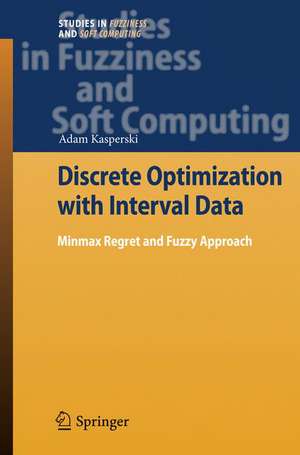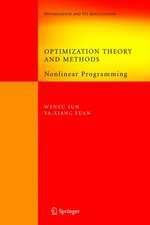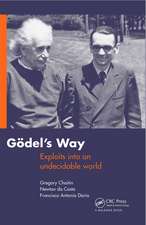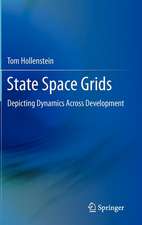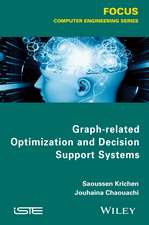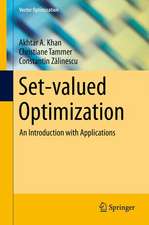Discrete Optimization with Interval Data: Minmax Regret and Fuzzy Approach: Studies in Fuzziness and Soft Computing, cartea 228
Autor Adam Kasperskien Limba Engleză Hardback – 4 iun 2008
| Toate formatele și edițiile | Preț | Express |
|---|---|---|
| Paperback (1) | 637.59 lei 6-8 săpt. | |
| Springer Berlin, Heidelberg – 23 noi 2010 | 637.59 lei 6-8 săpt. | |
| Hardback (1) | 643.84 lei 6-8 săpt. | |
| Springer Berlin, Heidelberg – 4 iun 2008 | 643.84 lei 6-8 săpt. |
Din seria Studies in Fuzziness and Soft Computing
- 20%
 Preț: 999.85 lei
Preț: 999.85 lei - 20%
 Preț: 653.06 lei
Preț: 653.06 lei - 20%
 Preț: 872.96 lei
Preț: 872.96 lei - 20%
 Preț: 930.57 lei
Preț: 930.57 lei - 20%
 Preț: 1051.00 lei
Preț: 1051.00 lei - 20%
 Preț: 992.44 lei
Preț: 992.44 lei - 20%
 Preț: 655.85 lei
Preț: 655.85 lei - 20%
 Preț: 1001.86 lei
Preț: 1001.86 lei - 18%
 Preț: 954.14 lei
Preț: 954.14 lei - 20%
 Preț: 330.10 lei
Preț: 330.10 lei - 20%
 Preț: 333.04 lei
Preț: 333.04 lei - 20%
 Preț: 997.56 lei
Preț: 997.56 lei -
 Preț: 391.61 lei
Preț: 391.61 lei - 20%
 Preț: 647.79 lei
Preț: 647.79 lei - 20%
 Preț: 986.01 lei
Preț: 986.01 lei - 18%
 Preț: 958.56 lei
Preț: 958.56 lei - 20%
 Preț: 996.40 lei
Preț: 996.40 lei - 20%
 Preț: 999.35 lei
Preț: 999.35 lei - 15%
 Preț: 646.43 lei
Preț: 646.43 lei - 20%
 Preț: 651.57 lei
Preț: 651.57 lei - 20%
 Preț: 997.89 lei
Preț: 997.89 lei - 15%
 Preț: 641.03 lei
Preț: 641.03 lei - 20%
 Preț: 1009.74 lei
Preț: 1009.74 lei - 20%
 Preț: 992.62 lei
Preț: 992.62 lei -
 Preț: 388.72 lei
Preț: 388.72 lei - 18%
 Preț: 1223.43 lei
Preț: 1223.43 lei - 20%
 Preț: 651.42 lei
Preț: 651.42 lei - 18%
 Preț: 951.59 lei
Preț: 951.59 lei - 18%
 Preț: 948.61 lei
Preț: 948.61 lei
Preț: 643.84 lei
Preț vechi: 757.46 lei
-15% Nou
Puncte Express: 966
Preț estimativ în valută:
123.20€ • 128.97$ • 101.94£
123.20€ • 128.97$ • 101.94£
Carte tipărită la comandă
Livrare economică 05-19 aprilie
Preluare comenzi: 021 569.72.76
Specificații
ISBN-13: 9783540784838
ISBN-10: 3540784837
Pagini: 240
Ilustrații: XVI, 220 p.
Dimensiuni: 156 x 234 x 19 mm
Greutate: 0.51 kg
Ediția:2008
Editura: Springer Berlin, Heidelberg
Colecția Springer
Seria Studies in Fuzziness and Soft Computing
Locul publicării:Berlin, Heidelberg, Germany
ISBN-10: 3540784837
Pagini: 240
Ilustrații: XVI, 220 p.
Dimensiuni: 156 x 234 x 19 mm
Greutate: 0.51 kg
Ediția:2008
Editura: Springer Berlin, Heidelberg
Colecția Springer
Seria Studies in Fuzziness and Soft Computing
Locul publicării:Berlin, Heidelberg, Germany
Public țintă
ResearchCuprins
Minmax Regret Combinatorial Optimization Problems with Interval Data.- Problem Formulation.- Evaluation of Optimality of Solutions and Elements.- Exact Algorithms.- Approximation Algorithms.- Minmax Regret Minimum Selecting Items.- Minmax Regret Minimum Spanning Tree.- Minmax Regret Shortest Path.- Minmax Regret Minimum Assignment.- Minmax Regret Minimum s???t Cut.- Fuzzy Combinatorial Optimization Problem.- Conclusions and Open Problems.- Minmax Regret Sequencing Problems with Interval Data.- Problem Formulation.- Sequencing Problem with Maximum Lateness Criterion.- Sequencing Problem with Weighted Number of Late Jobs.- Sequencing Problem with the Total Flow Time Criterion.- Conclusions and Open Problems.- Discrete Scenario Representation of Uncertainty.
Textul de pe ultima copertă
In operations research applications we are often faced with the problem of incomplete or uncertain data. This book considers solving combinatorial optimization problems with imprecise data modeled by intervals and fuzzy intervals. It focuses on some basic and traditional problems, such as minimum spanning tree, shortest path, minimum assignment, minimum cut and various sequencing problems. The interval based approach has become very popular in the recent decade. Decision makers are often interested in hedging against the risk of poor (worst case) system performance. This is particularly important for decisions that are encountered only once. In order to compute a solution that behaves reasonably under any likely input data, the maximal regret criterion is widely used. Under this criterion we seek a solution that minimizes the largest deviation from optimum over all possible realizations of the input data.
The minmax regret approach to discrete optimization with interval data has attracted considerable attention in the recent decade. This book summarizes the state of the art in the area and addresses some open problems. Furthermore, it contains a chapter devoted to the extension of the framework to the case when fuzzy intervals are applied to model uncertain data. The fuzzy intervals allow a more sophisticated uncertainty evaluation in the setting of possibility theory.
This book is a valuable source of information for all operations research practitioners who are interested in modern approaches to problem solving. Apart from the description of the theoretical framework, it also presents some algorithms that can be applied to solve problems that arise in practice.
The minmax regret approach to discrete optimization with interval data has attracted considerable attention in the recent decade. This book summarizes the state of the art in the area and addresses some open problems. Furthermore, it contains a chapter devoted to the extension of the framework to the case when fuzzy intervals are applied to model uncertain data. The fuzzy intervals allow a more sophisticated uncertainty evaluation in the setting of possibility theory.
This book is a valuable source of information for all operations research practitioners who are interested in modern approaches to problem solving. Apart from the description of the theoretical framework, it also presents some algorithms that can be applied to solve problems that arise in practice.
Caracteristici
Novel research results in the field of Discrete Optimization with Interval Data Presents a new approach (robust optimization) to modeling incomplete knowledge
